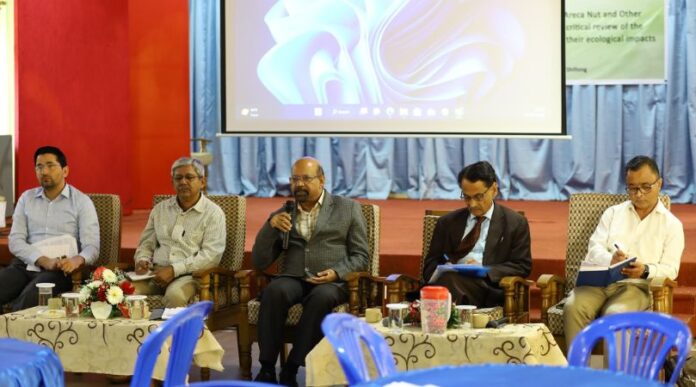SHILLONG:
The Centre of Excellence (CoE) for Natural Resource Management & Sustainable Livelihoods, MBDA organised a one-day consultative workshop on the theme “ Expanding Areas of Plantations of Areca nut and Other Commercial Species in Meghalaya: Critical Review of the Changing Landscapes with Reference to their Ecological impacts” at Moreau Institute of Integrated training (MIIT), in the city, on Thursday.
Aiming to offer critical examination of the impacts of monoculture plantations of commercial species such as areca nut, rubber, cashew, orange, among others on the ecosystems in the state, the workshop also intends to discuss the socio-economic dynamics as a result of practice of monoculture plantations of commercial species and sustainable scientific ways of farming systems for such commercial crops that protect the environment and conserve natural resources.
The expected outcome of the workshop is that participants will have an improved understanding on the impacts of commercial species plantation farming practices on the environment and identification of gaps that exist in the current cash crop farming.
S Aushutosh, Co- Chairman and Director Centre of Excellence for Natural Resource Management and Sustainable Livelihoods, MBDA delivered the introductory address and overview of the workshop, while resource persons from NEHU, MBDA, ICAR, Soil and Water Conservation deliberated on issues relating to cash crops with reference to their ecological impacts.
He explained how crucial it is to undertake steps scientifically to address the changes and ensure sustainable development.
Ashutosh presented his ongoing study on land use and land cover change in the state which analysed seven grids of 100 sq. km area will be completed using 20 to 22 grids covering 2022 sq km, which is 10 per cent of the total geographic area. The study has showed that over the period of 11 years plantation has increased by 300 per cent in Garo Hills region in which areca nut takes maximum plantation cover.
He also mentioned that under the Community Led Landscape Management Project supported by World Bank estimated 49.61 lakh areca trees in the community forests in 161 CLLMP villages in Garo Hills only.
The practices that farmers prefer in shaping land use dynamics and the incorporation of agro-forestry practices in private lands and to know the actual type of land tenure and land use practices in the state may enable framing policies on land tenure, agriculture, forestry and tree growing. It is learnt that Land Use and Land Cover (LULC) has rapidly changed in the state in the last two decades. One noticeable change in the LULC is the emergence of extensive plantations of horticulture and commercial species.
David Gandhi, Consultant for SALT farming at MBMA, presented on the topic – “Land use in Meghalaya in the context of agro-horticulture and NRM – with sharing from his field experiences in Meghalaya and Manipur”.
Gandhi also explained how the soil should be built for the conservation of nutrients and the improvement of soil health by showing a series of videos from his field visits to different districts, further emphasising the need to look beyond increasing production to conservation, as a lot of research has been done.
The major crops grown in Meghalaya are ginger, turmeric, and potato, with Khasi hills, Jaintia hills, and Ri Bhoi being the main regions for cultivation.
M Kharbani during his presentation presented the maintenance of the crop in a picture of an areca nut plantation. He explained how monocropping is always detrimental and not encouraged. Problems with the root system in areca nut have led to nutrients being washed away by the rain, but measures like proper spacing and cultural operations can help.
He explained ways to promote diversity, crops with minimal shade like coffee, banana, coconut, mulberry, pepper, among others can be grown alongside areca nut. He also recommended visiting and improving on what farmers are practicing, as well as using leeches as feed for chicken to increase profits.
Kharbani also mentioned that areca nut replaced oranges in War Jaintia due to the lack of mulching and proper care given to the crops. It was suggested to pay back a portion of the profit from the field to improve the soil. The presentation emphasised that sustainable agriculture practices are necessary to address the ecological imbalance in the state. “The onus is on us to work towards a better future for agriculture and the environment”.
Other presenters at the workshops include B K Tiwari, former professor NEHU, Dept. of Environmental Studies on the topic “Extent, causes and impacts of expansion of cash crops (areca nut) plantation and possible solutions to their ecological impacts”; N Raju Singh, Scientist, Agroforestry, DSRE, ICAR on topic “Agroforestry: a diversifies land use system for livelihood improvement and climate change and mitigation”; H Siangbood, Project Scientist, MINR, MBDA on topic “Integration of Aromatic plants in different cropping system”; James T Kharkongor, DPD, Centre of Excellence for NRM & SL, MBDA on topic “A brief comparison on the impacts of commercial plantation in Garo Hills and Khasi Hills”; Lavinia Mary Dkhar, Technical Specialist-NRM, CoE for NRM & SL on topic “Adverse impacts of monoculture plantation ecosystems”, and Sanwar M Swamy (IFS), DFO, Silviculture.


